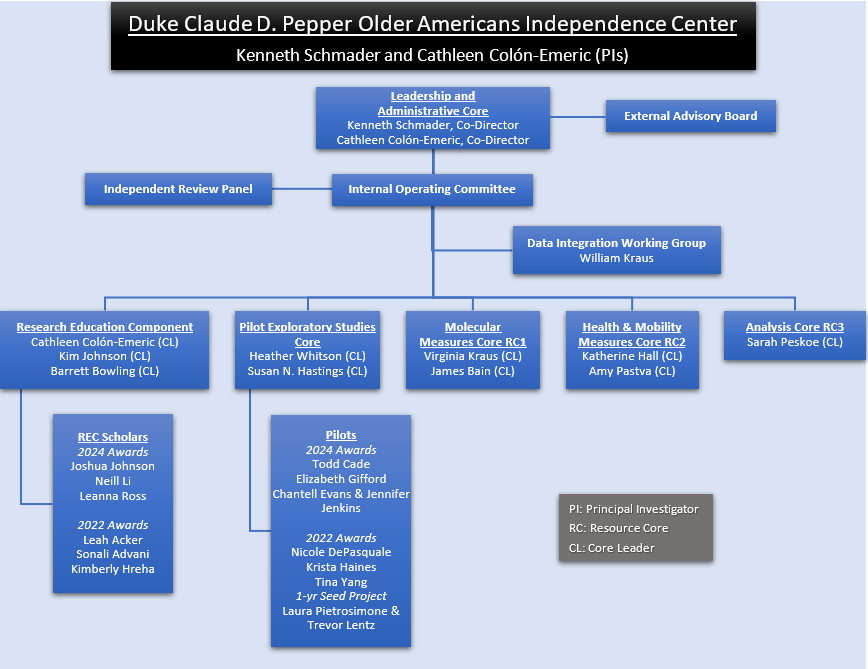
Continually funded by the NIA since 1991, the Duke Pepper OAIC is a national leader in research on physical reserve and resilience.
Principal Investigators

Professor of Medicine, Geriatrics
Professor of Medicine, Geriatrics and Palliative Care
Cores
The Leadership and Administrative Core (LAC) provides the scientific leadership and administrative infrastructure to create a robust environment for aging and geriatrics research in our theme:
To understand and optimize reserve and resilience
The Leadership and Administrative Core promotes the development of early investigators with interests in aging and geriatrics research and ensures the coordination, integration, funding, and translation of research within the Duke OAIC, a mission that supports our ultimate goal of improving the independence of older adults.
Core Leaders:

Kenneth Schmader, MD
Professor of Medicine, Geriatrics
Dr. Schmader’s primary area of research is herpes zoster and postherpetic neuralgia (PHN) and vaccines in older adults. He conducts pre-clinical, epidemiological, and intervention studies of zoster and PHN, particularly with the zoster and influenza vaccines. He is involved with other adult vaccine development in older adults. With colleagues in the Division of Infectious Diseases, Dr. Schmader investigates other infections in older adults. Another major research focus is adverse drug reactions, medication prescribing, and pharmacoepidemiology in the elderly. The objective of this work is to reduce adverse drug reactions, improve inappropriate prescribing, and determine drug use patterns in older adults.
Cathleen Colón-Emeric, MD, MHS
Professor of Medicine, Chief of Geriatrics
Current research focuses on the epidemiology, prediction, and prevention of osteoporotic fractures in elderly persons, and in improving the quality of care delivered to residents in skilled nursing facilities. Ongoing projects include a large, administrative database study of osteoporosis screening in men, a randomized trial of different staff education strategies to improve fall prevention in nursing homes, and several clinical demonstration projects. In 2017, Dr. Colón-Emeric received the Clinical Sciences Research Mentoring Award from the Department of Medicine, and in 2018 she was appointed Associate Dean for Research Mentoring for the School of Medicine.
EXTERNAL ADVISORY BOARD:
-
Karen Bandeen Roche, PhD Chair, Johns Hopkins Pepper OAIC
-
George Kuchel, MD University of Connecticut Pepper OAIC
-
Neil Alexander, MD Michigan Pepper OAIC
The Research Education Component (REC) recognizes that training in aging research faces several unique challenges, including difficulties recruiting geriatricians into research careers and a lack of training in the principles of aging research by other medical disciplines.
The objective of the Research Education Component is to develop the next generation of researchers who will become leaders in integrating basic science and clinical insights into innovative interventions promoting reserve and resilience in late life. Every two years the REC releases a request for proposals and funds up to three promising Duke early-career investigators with Pepper Career Development Awards.
Core Leaders:
Cathleen Colón-Emeric, MD, MHS
Professor of Medicine, Chief of Geriatrics
Current research focuses on the epidemiology, prediction, and prevention of osteoporotic fractures in elderly persons, and in improving the quality of care delivered to residents in skilled nursing facilities. Ongoing projects include a large, administrative database study of osteoporosis screening in men, a randomized trial of different staff education strategies to improve fall prevention in nursing homes, and several clinical demonstration projects. In 2017, Dr. Colón-Emeric received the Clinical Sciences Research Mentoring Award from the Department of Medicine, and in 2018 she was appointed Associate Dean for Research Mentoring for the School of Medicine.

Kimberly Johnson, MD
Professor of Medicine, Geriatrics
Chief Health Disparities Research Officer, Duke Clinical and Translational Sciences Institute
Dr. Johnson's nationally-known research on disparities in palliative care has identified multi-domain, multi-level factors that may explain lower rates of palliative care use among older African American compared to White adults and is testing interventions to reduce disparities and improve the quality of palliative care. Over the last 7 years, she has led a research education and training program focused on addressing disparities in healthcare delivery, by improving the quality of patient-centered care in the clinical encounter across diagnoses and throughout the lifespan.
C. Barrett Bowling, MD, MSPH
Associate Professor of Medicine, Geriatrics and Palliative Care; Population Health Sciences
Associate Director of Clinical Programs, Durham VA GRECC
Dr. Bowling's research aims to inform patient-centered care that focuses on optimizing function and quality of life over traditional disease-based approaches. Much of his work has focused on chronic kidney disease, however he has recently broadened the scope of investigation to include other chronic conditions including hypertension and systemic lupus erythematosus. Dr. Bowling has also partnered with nephrologists to develop clinical programs in the VA designed to provide patient-centered, geriatric care for older adults with kidney disease.
The overall objective of the Pilot/Exploratory Studies Core (PESC) of the Duke OAIC is to conduct pilot studies that inform the selection, design, and conduct of subsequent larger, hypothesis-driven research in our theme: To understand and optimize reserve and resilience.
The Pilot/Exploratory Studies Core emphasizes physiological reserve at the cell/tissue/organ level, which we hypothesize is a key contributor to resilience at the whole person level. Every two years the PESC releases a request for proposals and funds up to four Pepper Pilot Study Awards to Duke investigators to conduct innovative aging research in reserve and resilience.
Core Leaders:

Heather E. Whitson, MD, MHS
Professor of Medicine, Geriatrics; Ophthalmology
Director, Duke Aging Center
Dr. Whitson’s research is focused on improving care and health outcomes for people with multiple chronic conditions. In particular, she has interest and expertise related to the link between changes in the eye and brain (e.g., Why do cognitive and brain changes occur in the context of late-life vision loss? Is Alzheimer’s Disease associated with distinctive changes in the retina, and could such changes help diagnose Alzheimer’s early in its course?). She has developed a novel rehabilitation model for people with co-existing cognitive deficits, and is part of an inter-disciplinary team seeking to improve peri-operative outcomes for frail or at-risk seniors who must undergo surgery.
Susan N. Hastings
Chief, General Internal Medicine
Professor of Medicine, Geriatrics and Palliative Care; Population Health Sciences
Director, Durham VA Health Systems Research Center of Innovation
Dr. Hastings' research focuses on three areas: (1) identifying and mitigating threats to function and independence among older adults; (2) acute care and transitions in care for older adults; and (3) implementation science.
Molecular profiling can uniquely discover biomarkers, and predict and monitor traits and processes to understand and optimize reserve and resilience
The goal of the Molecular Measures Core (MMC) is to promote an understanding of the means to optimize whole person reserve and resilience through analyses of molecular factors indicative of cellular and tissue level ability to withstand and recover from stressors. The Molecular Measures Core complements the whole person level analyses offered through the Health and Mobility Measures Core and is inter-dependent with the Analysis Core, which is responsible for statistical analysis and modeling of data generated by the Health and Mobility Measures Core and Molecular Measures Core.
The Molecular Measures Core has extensive molecular profiling capabilities including among others, inflammatory, metabolic, tissue matrix, genetic and genomic analyses. The Molecular Measures Core operates in the DMPI Metabolomics Lab and has capabilities to expand and adapt existing core capabilities to facilitate the many needs of the novel investigator-initiated research projects affiliated with our Duke OAIC.
In addition to providing ongoing collaboration and support to the Pepper Career Development Awardees and the Pepper Pilot Study Awardees, the MMC contributes to externally funded projects such as the MURDOCK Study, The Dunedin Study, CALERIE, EPESE, and DDYNAMO.
CORE LEADERS


Virginia Byers Kraus, MD, PhD
Mary Bernheim Distinguished Professor of Medicine; Adjunct Professor of Pathology and Orthopaedics
Founding member: Duke Molecular Physiology Institute
Dr. Kraus' career has focused on discovery and validation of biomarkers of aging and arthritis. Dr. Kraus is trained as a molecular biologist and rheumatologist, and has been in charge for over 10 years of overseeing the inflammatory markers and metabolomics work for the aging-related Pepper Center projects at Duke. This has led to a close working relationship with the collaborating researchers making up the Duke OAIC Pepper Research team.
James Bain, PhD
Associate Professor of Medicine
Founding member: Duke Molecular Physiology Institute
Dr. Bain's work focuses on small-molecule phenotyping via mass spectrometry. Since its founding in 2003, the Metabolomics Laboratory has maintained a strong focus on diabetes, obesity, cardiovascular disease, and related conditions. They are especially interested in the perturbations in metabolic homeostasis that can occur early and late in the lifespan. In more than ten years of their close collaboration with the Duke OAIC Pepper Center, they have enjoyed working closely with early-career gerontologists and clinical geriatricians on their research projects.
The Health and Mobility Measures Core serves as the central resource for Center investigators seeking advice, training, laboratory access, and equipment for valid, sensitive, and reliable measures. The Health and Mobility Measures Core provides highly integrated, customized support to investigators supported by our Research Education Component, Pilot/Exploratory Studies Core, Externally Funded Projects, and the larger Duke Community engaged by the Duke Older Americans Independence Center.
The HMC aims to provide:
- Expertise and Consultation: To provide centralized expertise available for consultation on the measurement of reserve and resilience
- Development and Standardization: To develop measurement protocols and train personnel in administration and data collection
- Innovation and Standardization: To identify gaps in resiliency measures and develop or adapt innovative new measurement approaches across the adult lifespan for related outcomes
CORE LEADERS
Katherine S. Hall, PhD
Associate Professor of Medicine, Geriatrics
Duke Pepper Scholar
Investigator in Durham VA GRECC
Dr. Hall's research focuses on developing evidence-based physical activity interventions for older adults with an eye to preserving functional independence and quality of life. Dr. Hall is particularly interested in developing exercise programs to promote physical and psychological well-being among older veterans with post-traumatic stress disorder (PTSD).

Amy Pastva, PT, MA, PhD, CHSE
Assistant Professor of Physical Therapy; Medicine; Cell Biology; Population Health Sciences
Dr. Pastva’s research focuses on care transition and physical rehabilitative interventions for medically-complex and older adult populations, especially those with living with cardiovascular and pulmonary diseases and/or surviving critical illness.
The Analysis Core provides specialized expertise developing design, collecting and managing data, and providing and developing analytic methodology. The Analysis Core promotes novel lines of research by developing new methods specifically targeted to detect and measure reserve and resilience. Finally, the Analysis Core supports training objectives by developing fellow and faculty understanding of biostatistics and research methodology—critical areas of the research enterprise that are typically a knowledge gap in basic, translational, and clinical researchers.
The Analysis Core works closely with other components of the Duke OIAC to achieve shared goals. The Analysis Core collaborates with the two Resource Cores (Molecular Measures Core (MMC) and Health and Mobility Measures Core (HMC)) to manage the data and perform planned analyses. The Analysis Core collaborates within the OAIC investigators to direct study design and analysis, insuring that studies are properly powered and able to address their research questions, and, is positioned to expand these studies to evaluate additional or emerging hypotheses, including those that support methodologic investigations in statistical science, a unique goal of this Core.
CORE LEADERS

Sarah Peskoe, PhD
Assistant Professor of Biostatistics & Bioinformatics
Dr. Peskoe collaborates with researchers, clinicians, and fellows in the Center for the Study of Aging and Human Development, the Department of Surgery, and the Department of Medicine. Her methodological research involves correcting for biases arising in epidemiologic research, primarily as a result of measurement error and selection. Dr. Peskoe's main areas of interest include biomarker evaluation, electronic health records-based research, risk prediction, and survival analysis.







